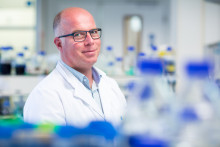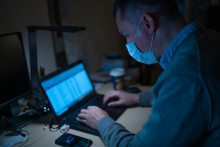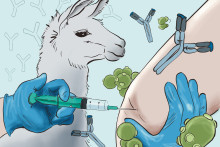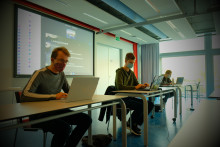Researchers from the department of Developmental BioEngineering are working on a sensor to detect cytokines, proteins released by our immune system to protect us against infection. Although that sounds like a good thing, our body can overreact and release too many cytokines, leading to so called cytokine storm. Diseases such as COVID-19 can be fatal because of this.
‘This storm can lead to organ failure and, in some cases, death,’ explains Karperien. ‘But if the medical staff knows that the storm is coming, they can intervene and help the patient.’ The professor’s team aims to provide them with a tool to that. ‘We want to develop a test that can be implemented in a hospital setting, for corona patients at the intensive care unit. Doctors can use it to measure cytokines levels and determine when the storm is coming.’
Joining forces
The scientists - Karperien, postdoc Jan Hendriks and PhD researcher Michelle Koerselman - were already working on cytokine detection using surface plasmon resonance (SPR) before the corona crisis. Which is why they were contacted by their UT colleague Richard Schatsfoort, who just started using SPR for detection of COVID-19 antibodies. ‘He asked if we could join forces and look at cytokines in corona patients in more details,’ says Karperien. ‘We immediately said yes. We jumped right in. If feels good to be able to contribute to resolving this crisis.’
Promising results
Now, about eight weeks later, they are confident that they can apply their knowledge and technology to COVID-19. ‘We have been working with real samples from COVID-19 patients at the MST hospital in Enschede,’ says Hendriks. ‘We are able to measure IL6, which is the most important cytokine. So far the results are promising. Our aim is to measure many patient samples simultaneously and get results in one hour. The speed is important, because the patients’ health often deteriorates within hours, and so the doctors need the results as soon as possible.’
The test still needs to be properly validated, but the researchers believe that they will be able to deliver it soon. ‘We expect to have the test operational after the summer,’ says Karperien. ‘There is still work to be done, but we have promising outcomes so far. There is a need for this type of test, no such sensor is available at the moment. We have experience in the field, and so we can move relatively fast. We are optimistic that it will work.’








